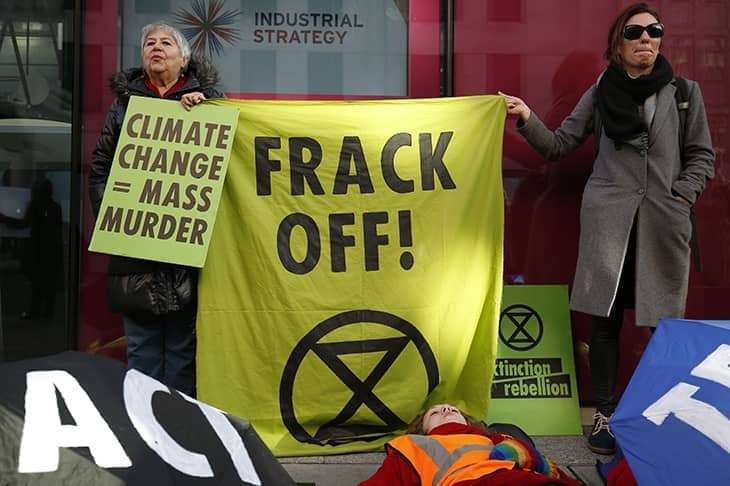I’ll approach the hot topic of a ban on Russian oil by way of personal anecdote: I’ve never been a soldier or a spook but I have twice found myself ensconced in secure Nato conference rooms. The first occasion was a group visit to the military alliance’s Brussels headquarters 42 years ago, when an unsmiling American defence expert introduced us to the concept of ‘Mutually Assured Destruction’ – whose acronym was the key to the tense but relatively stable Cold War stand-off. In simple terms, it would have been utter madness for either side to fire the first nuclear missile.
The odds on that happening by Kremlin order or error today are by no means as long as they were in 1980. But if that thought is too grim to contemplate, we’d better get our heads around a shorter-priced scenario: mutually inflicted economic mayhem. No version of that phrase I can come up with forms a label as neat as ‘MAD’ – but perhaps acronymic failure captures the randomness of impacts ahead. In simple terms again, we can only guess how markets and consumers will behave as the Ukrainian conflict unfolds. What we know is that the post-pandemic recovery is under threat and that inflation is set to multiply. What we’re told is that the only powerful weapon the West can deploy against Russia right now is a comprehensive sanctions regime, including a boycott of its oil and gas exports, so severe that it will cripple its economy. What we’re not told – because no one really knows – is how that assault will rebound on our own prosperity.
Between war and words
Which brings me to my second Nato encounter, at its college in Rome in 2012, when I was invited to lecture on the efficacy of sanctions in conflict. I began by quoting the former UN secretary-general Kofi Annan, who described sanctions as ‘a necessary middle ground between war and words’.
So be it, but I went on to cite studies of more than 200 examples of sanctions since the 1930s that showed at least two-thirds had failed to stop the aggressor, while causing adverse side effects: ‘Further impoverishing already poor people outside the power elite; damaging the commercial interests of countries imposing the sanctions; causing tensions with allies reluctant to join sanctions; offering a field-day for profiteering; reinforcing the regime they’re intended to weaken by offering a propaganda tool.’
I concluded that personally targeted measures, sequestering the fortunes of corrupt leaders, are far more likely to work than wider sanctions against whole nations, not least because they cause less collateral damage. So we must hope – though it’s not obvious so far – that the lust for riches of Vladimir Putin and the clique who hold him in power outweighs his megalomania.
Let’s get fracking, again
As wholesale oil and gas prices rocket at the prospect of an interdiction of Russian exports, we must also fervently hope that alternative sources can be found (and strategic reserves released) before the economies of the UK and Europe stall while millions of their people shiver in fuel poverty – and Russians ironically still have enough to keep warm. In that context, there’s a renewed chorus from investors and industrialists of ‘Let’s get fracking’. Are we not – they argue – sitting on several trillion cubic metres of accessible carbon fuel in the form of shale gas and have we not been importing large quantities from the US of the very same substance, extracted by the same proven technique of hydraulic fracturing, for at least the past five years? There are claims that improved methods can avert the seismic tremors that (along with the risk of toxic water pollution) provoked such fierce nimbyist opposition when UK fracking was first proposed a decade ago.
But having watched a senior minister batting away pro-frackers in a recent private meeting, I’m pretty certain it’s never going to happen. Cuadrilla, which would have been the biggest player, is sealing its wells in Lancashire; rival Ineos wrote off its investment in the sector two years ago. No matter that around one-fifth of the gas we need pro tem is right under our feet: no politician will pick this particular potato out of the embers.
Offshore rescue
But if onshore drilling is too visible, offshore rigs have no neighbours other than Greenpeace sailors and it surely makes sense to exploit remaining offshore carbon reserves to help bridge what will be a 25-year-plus transition to renewables – rather than leaving them under the ocean as yet more stranded assets. After an interval in which pre-war eco-activists had the better of the argument, the government now looks likely to sign off on a new round of North Sea drilling licences. Fields awaiting development in the area west of the Shetlands include Cambo and Rosebank for substantial supplies of both oil and gas, and Glendronach, a more difficult prospect but a potentially huge gas source.
All that is years away and scant consolation in the current crisis – but it would be absurd to rely for the next 25 years, for appearance’s sake, on the uncertainty and volatility of energy imports. On that theme I’m grateful to Shetland News for both a statistic and a parable.
The statistic is that the ‘carbon intensity’of imported liquefied natural gas is on average almost three times that of North Sea gas (the lower the intensity, the greener the fuel). The story concerns the Maltese-registered tanker Hellas Diana, with a capacity of 174,000 cubic metres of LNG. Having loaded at Corpus Christi, Texas, in November and passed through the Panama Canal en route to unload at Tianjin, China, the vessel U-turned in mid-Pacific as gas prices kept rising and sailed all the way here instead, traders having bought its cargo to fill a hole in UK demand in January. That’s another form of madness.







Comments